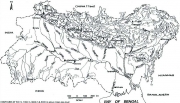Nilanjan Ghosh
River basin governance: Learnings from Cauvery conflict
Posted on 15 Feb, 2019 01:38 PMThe river Cauvery—an inter-state river shared by the southern states of Karnataka, Kerala and Tamil Nadu, as well as the Union Territory of Pondicherry—has often been in the news for the fight over its waters between Karnataka and Tamil Nadu. What dominates the issue is the conflicting demands for irrigation from the plateau region of Karnataka and the delta region in Tamil Nadu.

Water sharing: Beyond economic concerns
Posted on 15 Nov, 2016 11:49 AMThe Ganges-Brahmaputra-Meghna (GBM) basin is the third largest river flow system in the world with an annual runoff about 1,150 billion cubic meters (BCM) and the peak outflow of 1,41,000 cumecs.

Conceptual framework of South Asian water futures exchange - Commodity Vision
Posted on 18 Dec, 2010 12:15 AMIn this article published in Commodity Vision, the author presents the concept of the establishment of a 'futures market in water availability' in the context of the risk of water availability that Indian agriculture has been facing in the recent years.
With South Asian agriculture being dependent on the timely occurrence of the monsoons, any deviation from the scheduled arrival of the monsoon causes problems not only for the farmers, but also produces a threat to the food security of the region. However, the author argues that, there is no market in South Asia where users and investors exposed to water availability risk can effectively hedge against such a risk.
Holistic Engineering and Hydro-Diplomacy in the Ganges-Brahmaputra-Meghna Basin - EPW Paper
Posted on 23 May, 2010 04:49 PM This document by Jayanta Bandyopadhyay, highlights the importance of the Ganges-Brahmaputra-Meghna (GBM) basin as an important source of water for many of the countries in South Asia, and the crucial role of negotiations in the context of the impending water crisis threatening the basin with the phenomenon of climate change.
This document by Jayanta Bandyopadhyay, highlights the importance of the Ganges-Brahmaputra-Meghna (GBM) basin as an important source of water for many of the countries in South Asia, and the crucial role of negotiations in the context of the impending water crisis threatening the basin with the phenomenon of climate change.
The document argues that traditional water engineering has been found to be highly reductionistic and ineffective in bringing about development in the GBM basin and the continuing poverty in the GBM basin can be linked to the absence of a holistic ecological perspective, use of an incomplete framework for economics and ignoring of long-run economic costs of the actions proposed.